This guide will help you cope with every aspect of the PI cognitive assessment (last update: November 7th, 2023).
Watch my video guide and also get the 8 most important tips for success on the test. You can join the discussion at the bottom to receive answers to your questions. Let’s start!
Tip 1: Know the 9 Question Types
There are 9 question types on the PI cognitive assessment, and you better familiarize yourself with each one of them if you want to do well on the test. It’s not necessarily about mastering each question type; It’s more about knowing what you’re good at and what makes you waste too much time. Identifying your strengths and weaknesses at this step will help you perform better on the test, as you’ll be able to make quick decisions on whether to skip a certain question or not. You can approach this preparation step in a more “relaxed” manner, i.e. without timing yourself yet. I recommend that you see how well you fare with each question type by practicing sample questions. I’ve listed some great resources below.

Start with the official sample questions!
Not many candidates are aware of the 20 official PI cognitive assessment sample questions which are found on the Predictive Index website. These questions are available in two formats.
- A timed test with 20 questions.
- A PDF that includes the same questions and an answer key.
The PI does NOT offer explanations per question and it will not provide a score report. I offer a PDF that explains these 20 questions in detail. Make sure to grab a free copy of it here:
Tip 2: Take a Full-length Practice Test
Taking a PI cognitive assessment practice test is beneficial as it will add the time-pressure element to the topics presented above. A full-length PI assessment lasts 12 minutes and includes 50 questions. Taking it straight away without some preliminary preparation may be overwhelming in the beginning, and you can start with a shortened, compact version of the test (e.g. 25 or 30 questions, with respective time constraints) to get the hang of it prior to committing to the real deal.

You’re welcome to try my free sample test with 30 questions and 8 minutes, which is provided as part of the prep course I just mentioned in the previous section.
I offer a tailored prep course for the PI cognitive assessment, which includes lots of practice materials, video lessons and practice drills. Most importantly, it also includes 4 full-length mock tests (12 minutes, 50 questions each).
Join over 2,400 candidates who’ve increased their score potential with my prep course.
- Predictive prep: This resource nicely displays 12 original sample questions that adhere to the PI cognitive assessment style. Good brain teaser!
Tip 3: Speed is Key
Similar to other pre-employment cognitive ability tests, the PI cognitive assessment is all about completing as many questions as possible in 12 minutes. Your ability to answer correctly more questions indicates your ability to process complex information and your capacity to deal with the cognitive demands of the job.
However, you are NOT supposed to correctly solve all the questions in the allotted time: only 1% of the population are able to correctly answer more than 40 questions on the test.
Your main goal is to see ALL 50 questions so that you increase your chances of solving as many questions as possible that fall under your strengths.
You do not want to run out of time at question 14/50 and discover that you haven’t had a chance to look at 36 other questions on the test. Many candidates fall into this trap and underperform.
Learn more about this in my blog article, how to solve 50 questions in 12 minutes.
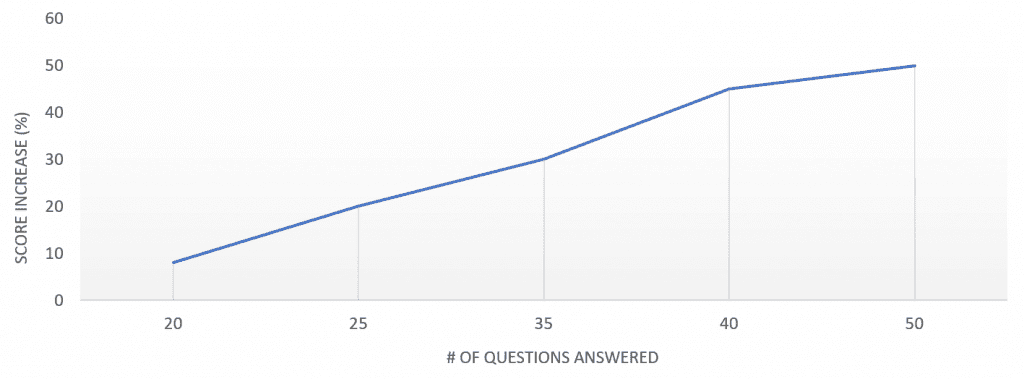
Tip 4: Take the Assessment in Your Mother Tongue
The first step before taking the test will be choosing your language.
The PI cognitive assessment is available in over 50 languages and I urge you to take the test in your mother tongue, given of course that your reading speed and vocabulary are indeed better in your mother tongue.
If you take the test in a second language, you will likely read slower, stumble upon more unknowns, and this can affect your score by up to 6 or 8 missed answers – a huge impact that can take your score from the 90th percentile to the 50th percentile!
Here is the list of available languages for the PI Cognitive Assessment:
Afrikaans; Albanian; Arabic (Gulf); Arabic (International); Armenian; Azerbaijani; Basque; Bengali; Bulgarian; Catalan; Chinese (Simplified); Chinese (Traditional); Croatian; Czech; Danish; Dutch; English; Estonian; Farsi; Filipino; Finnish; Flemish; French; Georgian; German; Greek; Hebrew; Hindi; Hungarian; Icelandic; Indonesian; Italian; Japanese; Kazakh ; Khmer; Korean; Lao; Latvian Lithuanian; Macedonian; Malayalam; Malay; Norwegian (Bokmål); Polish; Portuguese; Portuguese (Brazil); Punjabi; Romanian; Russian; Serbian (Latin); Slovak; Slovenian; Spanish (Modern Sort); Swahili; Swedish; Tamil; Thai; Turkish; Ukrainian; Urdu; Vietnamese; Xhosa; Zulu
Tip 5: Stand for Your Rights as a Test Taker!
You must be aware of the below two points.
The test can be administered in two rounds or a single round. This depends on the employer. If it’s two rounds, then round 1 is done from the convenience of your home and round 2 is done at the employer’s premises.
Anyone can have a bad day or a misfortunate incident that could lead to a lower score than expected. If you feel like you’ve done poorly on any of the rounds, speak it out! Tell the employer or recruiter what prevented you from performing well and ask to be re-tested. Hopefully, your request will be approved.
Here are important quotes from the official PI cognitive assessment admin guide regarding retesting:
Allowing respondents to retest may also help to more accurately assess respondents who perhaps are less familiar with timed, computerized assessments.
As you can see, the PI company believes that it’s beneficial to allow a candidate to be retested.
And here’s another important quote:
[The employer] may need to communicate the results to the respondent to help them decide whether they would like to retest. Respondents will see a different configuration of items at each administration; however, respondents should not be allowed to take the PI Cognitive Assessment more than three times. If a respondent takes the PI Cognitive Assessment multiple times, the selection decision should be based on his or her highest score, regardless of which attempt is associated with that score.
If company chooses to only assess respondents once, there are still some conditions under which a retest may still be warranted:
• A respondent reports technical problems, like internet disconnection.
• A respondent reports being highly distracted during the assessment due to unforeseen
circumstances, like a fire alarm.
From the above, we learn that communicating your difficulties to the employer/recruiter can help prevent your application from being disqualified. If you come across any unexpected issues during the assessment, you should ask for a second chance.
I’m quoting again from the official admin guide:
The Predictive Index offers two extended time formats of the PI Cognitive Assessment: 18-minute and 24-minute versions, which allow for time-and-a-half or double the original time limit, respectively.
If you have a case for reasonable accommodation, use it! This can completely change your score.
Tip 6: Understand What is a Good Score for Your Job
Knowing how PI cognitive assessment scoring works is important, as you will be able to set yourself a goal according to the employer’s expectations. Read more about PI cognitive assessment scores or take a free sample lesson that explains this topic further.

(Bonus)Tip 7: Step Into Your Employer’s Shoes
The PI company, the official publisher of the assessment, provides a lot of information to prospective customers (employers) about the test. If you really want the full picture of the test’s objectives, capabilities, and more, I recommend visiting this page on their website. Not a must, but definitely another interesting aspect to consider.
And there’s the Predictive Index company’s official Knowledge Base area that provides all the professional information about the PI cognitive assessment. If you have the time to spare, it’s worth the read! It includes 8 links to different topics that dive into the test’s mechanics, from scoring to admin guides. For example, in this video tutorial, they explain to employers how the assessment differs from an IQ test, and what makes this assessment such a good predictive tool for job success. In my opinion, this is invaluable, free information for candidates.
Take My Prep Course to Get Started
Your journey to a higher PI cognitive assessment score starts here. Join over 6,000 candidates who’ve benefited from my pi cognitive assessment prep course. Rated 4.9/5!
(Bonus)Tip 8: Tell Yourself That You Can Improve!
Taking a test like the PI cognitive assessment is an overwhelming experience. The further away you are from your college days, the more overwhelming you’ll find this test. Be it the time control and/or the content, it’s certainly not something you’re accustomed to doing in your daily routine. Some candidates would turn off a job offer that asks them to take the PI cognitive assessment just because they fear their performance won’t be up to par. Naturally, these feelings intensify and are in correlation with one’s age. The older you are, the more likely you’ll find this test to be challenging.
However, you must trust science here (and my experience): your score and performance can improve if you train in advance and approach the test with the right mindset.
Nice to meet you! I am Gideon, Founder at 12 Minutes
My prep courses have been taken by over 150,000 candidates.
I know pre-employment cognitive ability tests inside out and I am passionate about helping you succeed. Join the discussion below if you have any questions, or simply use the chatbox at the bottom right corner.
Take My Prep Course to Get Started
Your journey to a higher PI cognitive assessment score starts here. Join over 6,000 candidates who’ve benefited from my pi cognitive assessment prep course. Rated 4.9/5!


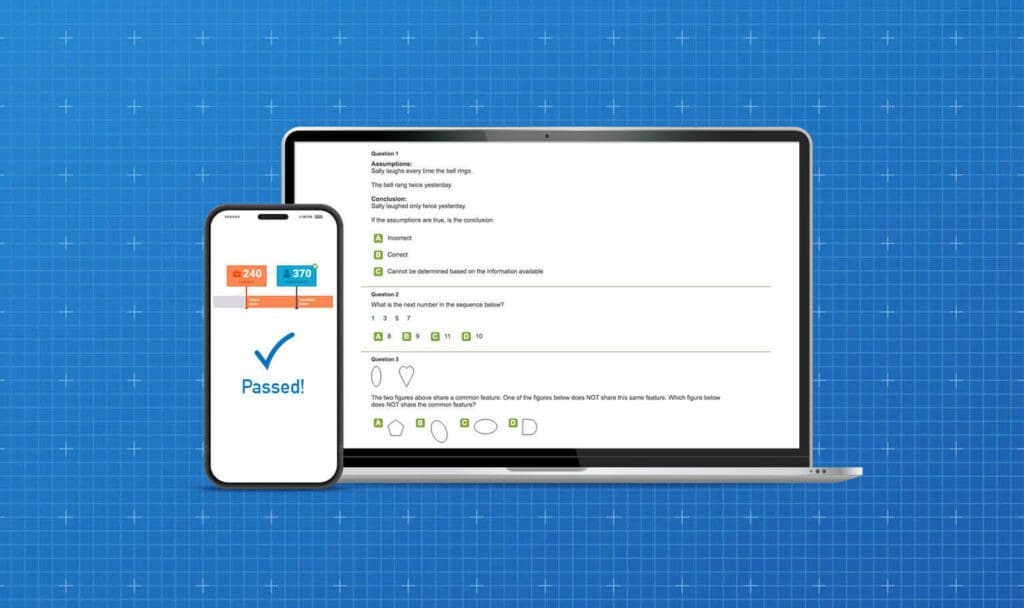






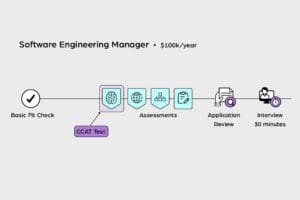
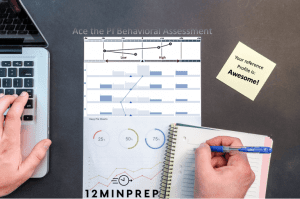
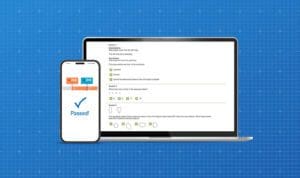







Comments
Can I choose my own language also for the prep course/test?
Hi Thomas,
The course is available in English. However, the practice tests and quizzes can be easily translated using Google Chrome’s translate feature, which does a great job. In such a case, the videos will be the only element that will remain in English 🙂
Feel free to contact us via the chatbox at the top left corner (Need Help?)
Hi, I did the 20 minutes sample test in my mother tongue, Hunagrian. Just wanted to let you know that question 12 does not work in Hungarian. Sleeping and sleep are both spelled “alvás” in hungarian therefore “hunger is to food” and “hunger is to eating” are both correct answers.
That’s interesting, thanks Barbara. We shall review the question. Just wondering, did you use Google Chrome’s translation option for this?
This course helped me get a 31 on 50. I’m so happy I chose to invest in this course. Thank you
Thanks for letting me know and best wishes 🙂